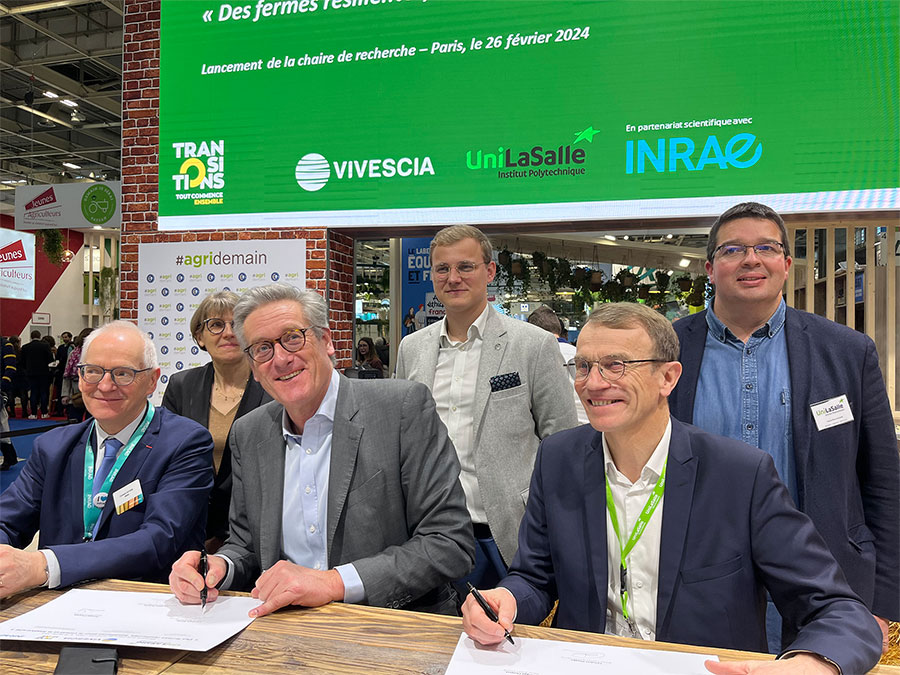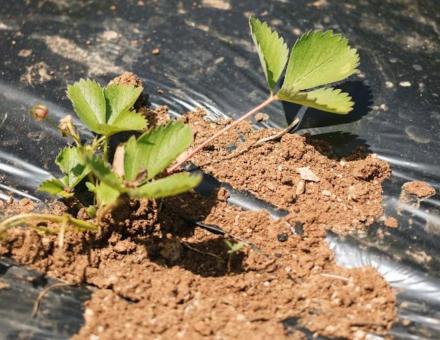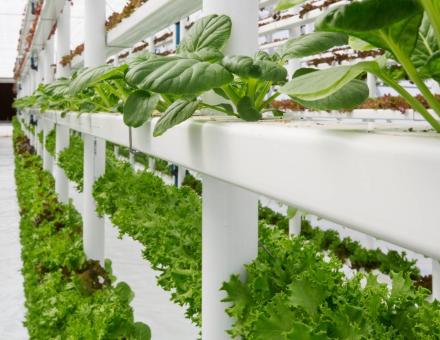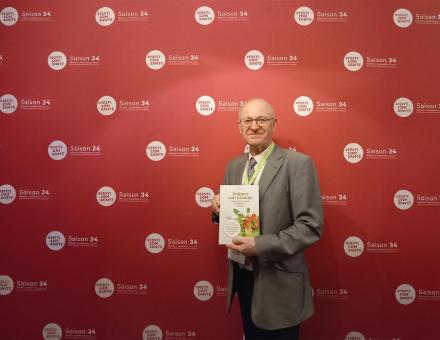The Chair was officially launched at the Salon international de l'agriculture.
A shared objective: to meet the challenges of the agro-ecological and low-carbon transition by improving knowledge and stimulating innovation.
Conducted in collaboration with INRAE, this research chair is an integral part of the TRANSITIONS program, supported by VIVESCIA and its partners.
Christoph Büren, Chairman of the VIVESCIA Group, comments: "Science and innovation combined with feedback from the field are the foundation of our TRANSITIONS program. By 2026, this program aims to support almost 1,000 farmers in our regions in their transition to productive, low-carbon agriculture that is good for the soil and biodiversity. A fundamental partnership for VIVESCIA, this research chair with UniLaSalle is a gas pedal of solutions and progress for TRANSITIONS and our value chain."
Philippe Choquet, Managing Director of UniLaSalle, the engineering and veterinary school, comments: "Against a backdrop of climate change, this Chair, the fruit of a long-standing collaboration between VIVESCIA and UniLaSalle, will help to transform agricultural production systems by hybridizing the knowledge of farmers, VIVESCIA employees and our scientists.
One of the major challenges facing agriculture is to adapt to climate change in order to maintain its food production role, contribute to maintaining or even increasing soil organic matter, and reduce greenhouse gas (GHG) emissions and their impact on biodiversity. Reducing agriculture's environmental footprint (GHG and biodiversity) requires the development of agro-ecological practices combined with environmentally-friendly technological innovations. One of the key objectives in accelerating this transition is to develop farming systems that are more closely aligned with the principles of agroecology.
Christian Huyghe, Scientific Director for Agriculture - Inrae adds, "French and European agriculture will have to reconcile economic and productive performance, biodiversity restoration and resilience to climate change. To achieve this, we need to co-construct, in all regions, with professional players in production and processing, the path of transition towards profoundly revised agricultural and food production systems. Agroecology, by mobilizing functional diversity, offers levers for action that enable adaptation to local conditions. VIVESCIA, with its TRANSITIONS program, and UniLasalle have joined forces to create an industrial chair, with the ambition of training tomorrow's players and managers, and conducting research with other national research organizations and universities".

The UniLaSalle / VIVESCIA partnership is an obvious choice, as a new page of cooperation opens up.
UniLaSalle trains engineers in agronomy, agri-food, agro-ecology and the environment for the areas associated with VIVESCIA (Marne, Aube, Ardennes in particular). The TRANSITIONS programme supported by VIVESCIA provides an opportunity to structure a new stage in closer, longer-term scientific cooperation. The historical relationship, shared histories and a community of values based on commitment and collective action are the key elements that have enabled us to engage in dialogue and to bring this vast research chair project to fruition in less than six months.
A living laboratory made up of a diversity of farms, soils and plants
At academic level, this partnership is reflected in the production of knowledge with and for farmers (creation of databases and guides, seminars, conferences and articles) and in tools and methods (cover crop management tool, definition of future experiments, assessment of the impact of practices and permanent plant infrastructures on the restoration of biodiversity). "We believe that farmers and VIVESCIA experts have as much knowledge to share as researchers, and that this knowledge is complementary," explains Michel-Pierre Faucon, Director of Research - UniLaSalle.
He adds: "Success is based on teamwork between farmers, VIVESCIA and UniLaSalle. It is above all a human adventure, and our experience of working together contributes to a synergistic effect".
Research focused on the sustainability and resilience of agricultural production systems and regions
The aim of the four-year project is to identify which of VIVESCIA's cultivation practices can help crop systems adapt to and mitigate climate change.
"What is not measured cannot be improved. Experimentation and data analysis are essential for changes in cropping systems. Changes in practices mean risks, so we need to be able to measure them in order to anticipate them", stresses Etienne Mignot, Agricultural Engineer at VIVESCIA Coopérative and coordinator of the agronomic base of the TRANSITIONS programme. "We want to develop a systemic vision, which implies mobilising a wide range of knowledge and expertise to be able to propose innovative solutions adapted to our territories and taking into account the human and organisational dimensions. The Chair will be a real accelerator", adds Savine Oustrain, Director of Research and Agronomic Innovation at VIVESCIA Coopérative.
It has four objectives:
- To identify high-performance, stable varieties and optimum technical itineraries for adapting crops to climate change
- Improving the greenhouse gas emissions balance of cropping systems by identifying combinations of agroecological practices
- Maximising the biomass productivity of intermediate crops and their ecosystem services
- Designing or adapting an assessment method for farms to restore biodiversity






